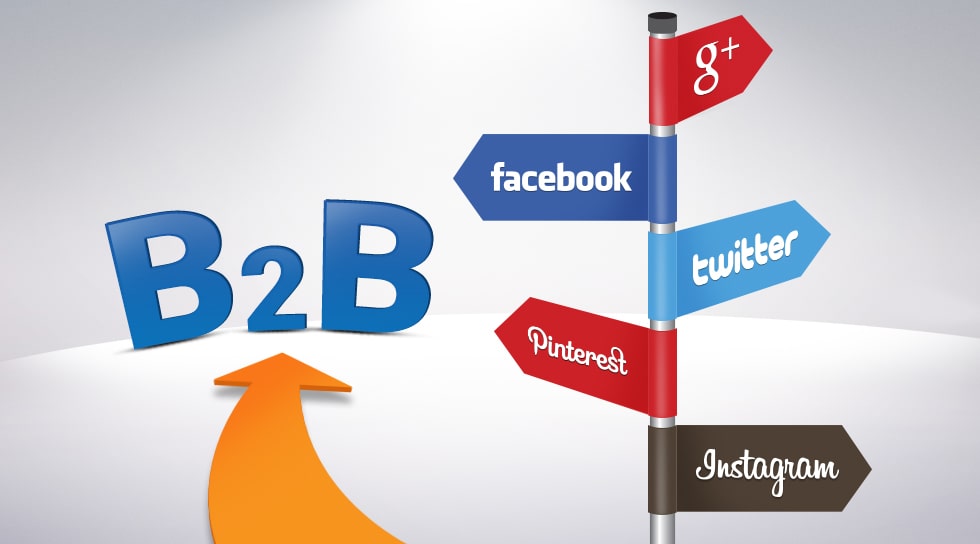
Social Media for B2B Marketing
Only industry analysts and web search ranked higher than social media when survey respondents were asked to name the marketing channels that impacted a recent purchasing decision.
Business-to-business (B2B) marketers are often faced with the challenge of communicating the benefits of complex, multifaceted systems to a range of customers and prospects. How are these systems best positioned in front of their potential customers? In the age of digital, how do B2B marketers keep up in ways that truly engage?
The perception is often that social media is a straightforward dialogue. It falls under the purview of consumers that social media, the domain of selfies and memes, is not serious enough to be effective for B2B marketing. But this couldn’t be further from the truth.
We recently partnered with Researchscape to survey more than 500 decision maker executives of mid- and large-size companies across industries to understand how they assess B2B vendors, consume media and are influenced by marketing channe
Your Prospects Are On Social Media
In our findings, most senior executives use social media for business purposes. In fact, 83% of executives that choose a vendor on behalf of their company use social media in their decision-making, and 92% of that segment says that social media influenced a purchasing decision within the last year, according to our research.
Social media presence should never replace a website. Social media marketings goal is to get people to your website.
According to the Content Marketing Institute’s 2017 report, 83% of B2B marketers say that social media is the tactic their organizations use most. In fact, we found that they use social more than any other channel on a daily basis. Social media leads to heightened brand awareness, but we found that brand awareness isn’t the only impact of a social media campaign. It is also one of the most effective marketing channels during the vendor selection process. Only industry analysts and web search ranked higher than social media when survey respondents were asked to name the marketing channels that impacted a recent purchasing decision. In other words, it’s safe to say that social media is making a direct impact on B2B sales.
So, which specific social media channels are impacting these sales?
First of all, Facebook is a top-ranking factor. It’s not just for consumer play and it’s as important as advertising on Google. Our research has found that B2B decision makers spend a lot of time on Facebook for professional reasons and are influenced by the information they find on this platform. LinkedIn is just as influential as Facebook among certain segments, so it’s a worthwhile investment to incorporate into your social media efforts. Twitter is important as well, but it should be prioritized below Facebook and LinkedIn. With the exception of some rare circumstances, Snapchat is not an effective platform for B2B marketing.
Use Social Media To Educate And Inform
Social media must be used strategically and consistently to be effective in influencing B2B sales. Because of the way social media and algorithm preferences are now structured, organic reach alone is not enough. Social media is a paid platform — to get the most out of it, your budget must be applied thoughtfully.
Start by establishing a Facebook page and maintaining a consistent presence by sharing a variety of content, including webinars, videos, articles, infographics and such that speak to the business challenges of your prospects. Use sponsored posts to elevate a strong piece of content and use Facebook ads and their targeting capabilities to attract new prospects to your community. The key, as is the case with much of B2B marketing, is to use social media as a way to deliver engaging content, not as an exclusive mouthpiece for your product and service demos.
This doesn’t mean that advertising on Facebook will automatically result in a direct click and sale, especially for enterprise sales. It’s unrealistic to judge a social media marketing campaign based on how many executives buy a $500,000 annual license based on the fact that they clicked an ad, just as one wouldn’t judge the success of an investment in a trade show booth by the number of sales made on the show floor.
It’s important to underscore that the B2B sales environment is complex and nonlinear since there are several decision makers that need to be engaged at various points in a sales cycle if a sale is to be made. This means that there are multiple touch points that need to be maintained. We know that Facebook is a critical one because executives who responded to our survey said that the social network influences their decisions when considering vendors.
Being included as a vendor in a request for proposal (RFP) or in the vendor selection process is not a simple endeavor. To be successful, you must consistently engage these decision makers with targeted thought leadership. It requires a concerted marketing effort, using a marketing mix that’s going to reach the right people in the right ways.
B2B marketers are taking note of the need for digital content and social media and improving their efforts — in fact, 62% stated their content marketing has been at least somewhat, if not much more, successful than it was just a year ago. And no matter how you structure your marketing, social media must be part of the mix if you’re going to optimize your digital marketing to drive sales.
1
- https://www.forbes.com/sites/forbesagencycouncil/2018/03/22/strategic-social-media-is-essential-for-driving-b2b-sales/?sh=97d9b1e1db02[↩]

